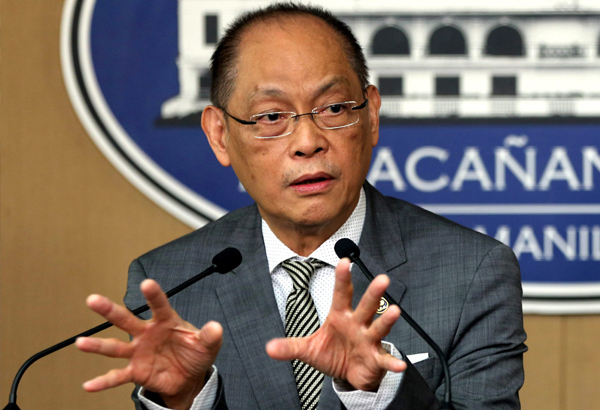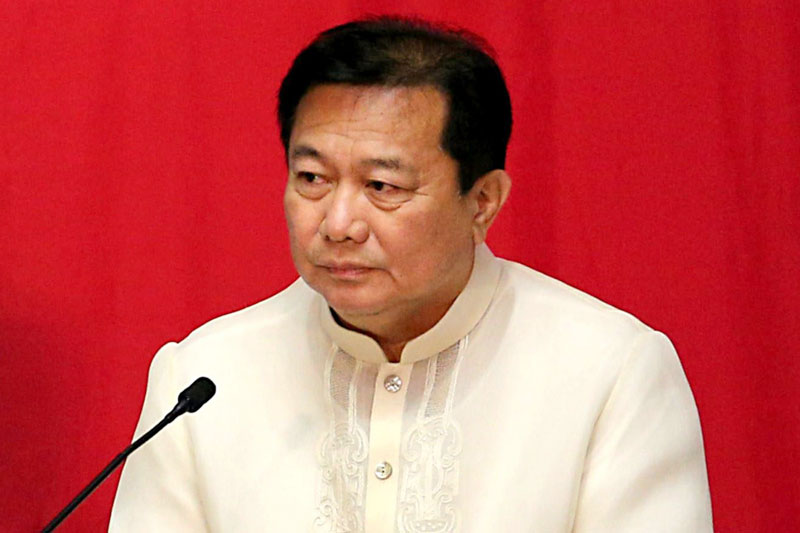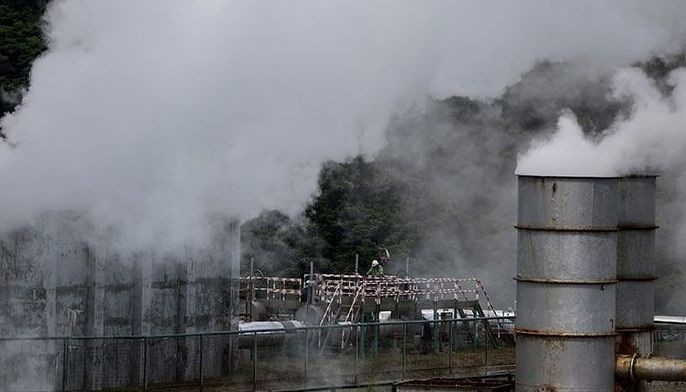Certain provisions in budget, TRAIN face Duterte veto

Budget Secretary Benjamin Diokno yesterday said the Department of Budget and Management (DBM) recommended and submitted to Malacañang a list of items in the 2018 General Appropriations Act (GAA) and Tax Reform for Acceleration and Inclusion (TRAIN) Act for possible presidential veto. Krizjohn Rosales, File
MANILA, Philippines — President Duterte might veto some provisions in the 2018 national budget and the tax reform act.
Budget Secretary Benjamin Diokno yesterday said the Department of Budget and Management (DBM) recommended and submitted to Malacañang a list of items in the 2018 General Appropriations Act (GAA) and Tax Reform for Acceleration and Inclusion (TRAIN) Act for possible presidential veto.
“We have submitted the draft of the veto message to the President, and as of today, we have not received (it) yet,” Diokno said.
Diokno declined to specify which provisions in the GAA and TRAIN law were recommended for line item veto. He only said Malacañang might release the final veto message within a day or two.
“The Constitution says that in the case of budget, tax and tariff, the President can exercise his right for line item veto,” he added.
Duterte signed the 2018 GAA and the TRAIN Act on Tuesday. Both measures went through hours of deliberation in the bicameral conference committee, but these are still facing objections.
According to the DBM, the P3.767-trillion budget for next year is 12.44 percent higher than this year’s P3.35 trillion.
As the first budget crafted and owned by the Duterte administration, the DBM said the 2018 budget seeks to “strengthen the country’s foothold in the implementation of reforms that will bring about positive and lasting transformation.”
The DBM said P1.1 trillion of the budget next year will be allocated for infrastructure projects.
In addition, Congress also approved P40 billion for the implementation of the Universal Access to Tertiary Education Act, P2 billion for the subsidy of irrigation service fees, P64.2 billion for the salary increase of uniformed personnel and P10 billion for Marawi rehabilitation and recovery program.
The TRAIN law, on the other hand, increases the tax-free income of taxpayers to P250,000 a year, or P20,833 a month.
But the TRAIN Act seeks to raise revenues by adjusting excise taxes of fuel, automobile, sugar-sweetened beverages and coal, and expand the tax base by removing value-added tax exemptions.
Up to 7.5 million employees and professionals are expected to enjoy lower income tax when the law takes effect next month.
Quirino Rep. Dakila Cua, chair of the House committee on ways and means, said the income tax cut means that employees and professionals would have a bigger take-home pay.
Cua’s Senate counterpart, Sen. Juan Edgardo Angara, cited concrete examples of how the TRAIN would greatly benefit government and private sector employees.
Angara said under the present tax code, a taxpayer who is single is entitled to a personal annual tax exemption of P50,000 or P4,167 a month.
“This will increase to P250,000 in January, or an additional annual income of P200,000 that will not be subject to tax. The adjustment will translate into an additional monthly tax-free income of P16,667,” he said.
In the case of a working couple, they will enjoy a combined tax-free income of P500,000 a year or P41,667 a month. At present, they are entitled to exemptions of up to P200,000.
“This means that they will have an additional annual tax-free income of P300,00, or P25,000 a month,” Angara said.
He pointed out that the monthly income of P20,833 that is not subject to tax under the TRAIN law is equivalent to the entry-level pay in public schools. So most public school teachers will no longer pay income tax.
More taxes for commodities
While the TRAIN law would benefit millions of salaried workers, reservations were raised as the new law will increase taxes for cars, fuel, tobacco and some beverages, among others, in a bid to generate P130 billion in revenues.
Critics pointed out that what wage earners will gain from reduced income tax will be eroded by new and higher taxes on oil products, expanded coverage of the 12-percent value added tax and other levies.
A P6 tax will be imposed on diesel, kerosene, cooking gas and bunker fuel for electricity generation over three years up to 2020, while impositions on other oil products will go up.
For instance, the tax on gasoline will increase from P4.35 per liter to P10 over three years.
The net impact of the combination of lower income tax, on one hand, and new and higher taxes and other measures, on the other, is that the same group of taxpayers who will benefit from TRAIN and the public in general will pay an additional P130 billion a year.
That is the government’s gain, which Finance Secretary Carlos Dominguez III said would largely fund the administration’s infrastructure program.
‘Tax reform is anti-poor’
Manila Auxiliary Bishop Broderick Pabillo, chair of the Catholic Bishops’ Conference of the Philippines episcopal commission on the laity, said the costs of the new tax law outweigh its benefits.
“Many are against this tax reform package for being a policy that is against the poor since it will hike the VAT rate for everyone,” he said in an interview aired over Church-run Radio Veritas.
“Even if they are saying that they will remove the income tax of more workers, they are just a handful. But with the increase in prices of basic commodities, everyone will be affected by it,” he added.
Pabillo argued that instead of increasing taxes on basic commodities, the government should have increased the tax rate of known “sin” products like cigarettes and alcohol.
“I would rather they increase cigarettes and alcoholic drinks more so that it will be inaccessible to the people. But with basic commodities the ones taxed more, it will be the poor who will suffer more,” he lamented.
‘Give decent jobs, not dole-outs’
The government also plans to give P200 monthly dole-out and discount voucher as assistance to more than 10 million low-wage workers who will be affected by the higher taxes on commodities because of the tax reform law.
But for labor groups, this is not the solution.
“Government must provide the poor impacted by TRAIN with cash-for-work program beginning with skills training and competency improvement and providing them with jobs. If we give them dole-out and discount vouchers, the government will teach them to be lazy and dependent on someone else except from their selves,” Associated Labor Unions spokesman Alan Tanjusay said.
“Once millions of people become idle and lazy, it’s not sustainable, not good for our nation-building. But if we capacitate the poor to level up and give them the work opportunities, they become productive for our country, for themselves and for their families,” he explained.
Tanjusay urged the Department of Labor and Employment, Technical Education and Skills Development Authority to provide poor people with decent jobs.
“We do not have to re-invent the wheel. We already have government institutions and experts in the bureaucracy who can provide the needed capacity building and the work opportunities for the program,” he added. – Jess Diaz, Mayen Jaymalin, Edu Punay
- Latest
- Trending





























